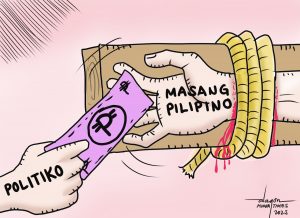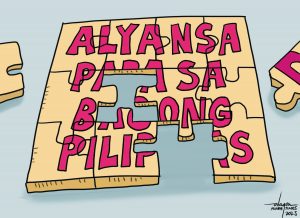By Tyrone Velez
Woman Lumad chieftain Bai Bibiyaon Ligkayan Bigkay from Talaingod, Davao del Norte has died, the Indigenous group Sabokahan IP Women announced December 6.
Bigkay died in an undisclosed place last November 20 “surrounded by loved ones,” the group said.
She is buried in an undisclosed location after her death, which was in accordance with her wishes, Sabokahan IP Women added. She has not returned to Mindanao since 2018 because of threats of arrests.
The famed “Woman Warrior of Talaingod,” who became the face of the Lumad struggle for decades, is believed to be about 90 years old at the time of her death.
Bibiyaon was born in Natulinan in Talaingod, the ancestral home of the Matigsalug and Manobo tribes.
In her biography, Ina Bai, her father was a tribal chieftain. At a young age, she showed her potential to lead when she would speak her mind in meetings and in resolving conflicts in the tribe and joined the resistance against logging companies encroaching their territory.
She was known as the first woman to lead as chieftain.
Bigkay explained how she got her long name during an event in 2017 in Manila where she was conferred the Gawad Tandang Sora Award for her defense of their ancestral domain.
She said “bai” is a title conferred to Mindanao women of stature, while “bibiyaon” is her title as chieftain of her tribe. Thus, her title Bai Bibiyaon was attached to her name Ligkayan Bigkay.
Bigkay participated in the Lumad Mindanao Peoples Federation (LMPF) Assembly in 1986 in Kidapawan, North Cotabato that united the Indigenous groups in Mindanao to resist threats of ethnocide from logging, plantation and militarization in their lands.
The assembly also resolved to use the term “Lumad” meaning “born of the earth” to unify the 18 ethno-linguistic tribes in Mindanao.
Bigkay was instrumental in the formation of the Salugpungan Ta Tanu Igkanugon in the early 1990s, a collective of Talaingod chieftains that united to resist the expansion activities of the logging firm Alcantara and Sons (Alsons). The Salugpungan waged a “pangayaw” against Alsons private guards.
In the 2000s, Bibiyaon was one of the Salugpungan leaders that pushed for the establishment of Salugpungan community schools with the help of religious groups and NGOs that supported them in the past.
Bigkay understood education is important to pass on their struggle to their next generation. “The youth need to be literate in order to protect their communities from further deception,” Sabokahan IP Women noted.
Bibiyaon also pushed education to help empower women. Sabokahan said the Bibyaon’s personal advocacy was to eliminate the traditional “buya” or arranged marriage.
“Rather than being confined to domestic roles and marriage, they could now become community health workers, teach scientific sustainable farming methods to improve the community’s food security, and school teachers,” the group said.
Bibiyaon’s stature made her a vital part in the formation of indigenous organizations, such as Katribu, Kalipunan ng Katutubong Mamamayan ng Pilipinas (KAMP) and SANDUGO Movement of Moro and Indigenous Peoples for Self-Determination.
She was the founding chairperson of Sabokahan To Mo Lumad Kamalitanan or “Sabokahan Unity of Lumad Women.”
When the Salugpongan schools were threatened by militarization, Bigkay joined the Manilakbayan campaign where Lumad leaders and students went to Manila to seek dialogue with officials and support from various institutions for their cause.
She had stayed in Manila since 2018, Sabokahan said, as there were threats of arrests after relatives in Talaingod were forced to sign affidavits calling for her “immediate rescue.”
She stayed with Lumad students who were “adopted” in bakwit schools in Manila, with students and teachers from various universities volunteering to teach the students.
The students call Ligkay as “inno” or grandmother, and remembers her waking up as early as 4 am to pound betel nuts, clean the surroundings and prepare the materials for making indigenous beads.
Behind her fierce stature, the students learn much from their “inno” who never complained of their situation in Manila, who would sing the uranda, teach them how to craft beads, and tell them stories of their ancestral land, the Pantaron Range in Talaingod.
Bigkay had never married, saying “she has everything within her to survive with her hands, feet and head,” Sabokahan Women said. “She was happily married to the struggle and inherited hundreds of grandchildren who looked to her for guidance.”
For her lifetime commitment to defending the Lumad and the ancestral domain, Bigkay was conferred the Most Distinguished Awardee of the Gawad Bayani ng Kalikasan or “Environmental Heroes Award” in 2018 by the Center for Environmental Concerns, and is the third recipient of the Gawad Tandang Sora Award in 2017 from the University of the Philippines-Diliman College of Social Work and Community Development.
(MindaViews is the opinion section of MindaNews. Tyrone A. Velez is a freelance journalist and writer.)


